Pehr Hilleström
Pehr Hilleström (18 November 1732 – 13 August 1816) was a Swedish artist. He served as a professor and director at the Royal Swedish Academy of Arts. [1]
Pehr Hilleström | |
|---|---|
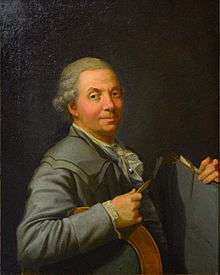 Self portrait (belongs National Portrait Gallery, Gripsholm Castle) | |
| Born | 18 November 1732 |
| Died | 13 August 1816 (aged 83) |
| Nationality | Swedish |
| Known for | Painting, Tapestry weaving |
_-_Nationalmuseum_-_17964.tif.jpg)
Biography
Hilleström was born on the island of Väddö in the district of Roslagen, Sweden where his uncle who was the vicar. He was the eldest of twelve children. He was first trained by landscape artist Johan Philip Korn (1727–1796). He received training at the Royal Swedish Academy of Fine Arts from artist Guillaume Taraval (1701–1750) and architect Jean Eric Rehn (1717–1793). Between 1757–1758, Hilleström made a study trip abroad. The journey went to Paris, Belgium and Holland. He furthered his education in the tapestry techniques and became a master tapestry weaver. [2]
From 1759, he operated a weaving workshop in Stockholm. In 1773, Hilleström became a member of the board of the Royal Swedish Academy of Arts. The academy appointed him a professor in drawing in 1794. In 1805 he received the post of Vice-Chancellor of the academy and in 1810 he succeeded Louis Masreliez (1748–1810) as Director.[3] [4] [5] [6]
Style
Hilleström painted some thirty portraits. He also performed a large number of depictions from the environments of the time. He produced numerous genre paintings of people performing various daily tasks inside upper- and middle-class homes in Stockholm. Dresses and furniture were painted exactly the way they looked and provide a valuable source of information about what life was like in those days. In addition to this, he painted craftsmen in action at mills and other early industrial workplaces. In later years, he also began to paint historic paintings and religious motives.[2]
Personal life
In 1759 he married Ulrica Lode (1737–1779). Hilleström was the father of the artist Carl Petter Hilleström (1760-1812). His descendants included author and museum curator, Gustaf Hilleström (1911-1994).[2][7][8]
Gallery
 People from Mora in Dalecarlia
People from Mora in Dalecarlia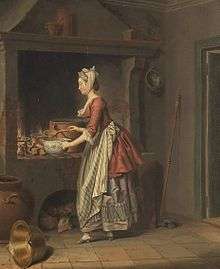 A maid taking soup from a pot
A maid taking soup from a pot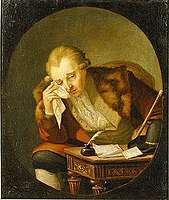 Portrait of Carl Michael Bellman
Portrait of Carl Michael Bellman_-_Nationalmuseum_-_18113.tif.jpg) Egg testing
Egg testing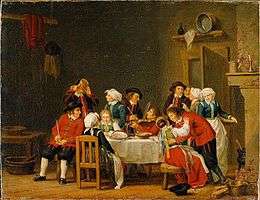 Convivial Scene in a Peasant's Cottage
Convivial Scene in a Peasant's Cottage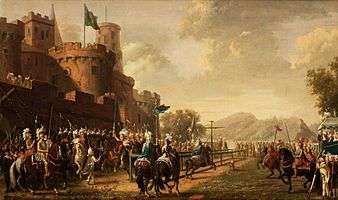 The enchanted forest, tournament at Drottningholm
The enchanted forest, tournament at Drottningholm Two Maid-Servants at a Brook
Two Maid-Servants at a Brook_-_Nationalmuseum_-_18152.tif.jpg) The Morning Toilet
The Morning Toilet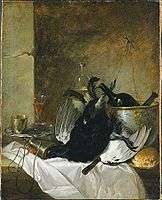 Still Life
Still Life_-_Nationalmuseum_-_19464.tif.jpg) Gustavian Style Interior with Cardplayers, c. 1779
Gustavian Style Interior with Cardplayers, c. 1779
References
- Gustaf Hilleström. "Pehr Hilleström". Svenskt biografiskt lexikon. Retrieved March 1, 2019.
- "Hilleström, Per". Svenskt biografiskt handlexikon. Retrieved March 1, 2019.
- "Johan Philip Korn". nationalmuseum. Retrieved March 1, 2019.
- "Guillaume Thomas Taraval". Svenskt biografiskt handlexikon. Retrieved March 1, 2019.
- "Jean Eric Rehn (1717-1793), architect, Surveyor of the Court". wikidata.org. Retrieved March 1, 2019.
- Åke Meyerson. "Louis A Masreliez". Svenskt biografiskt lexikon. Retrieved March 1, 2019.
- "Carl Peter Hilleström". Svenskt biografiskt handlexikon. Retrieved March 1, 2019.
- "Hilleström, Gustaf (1911-1994)". L’Abes. Retrieved March 1, 2019.
Other sources
- Pehr Hilleström in Nordisk Familjebok (in Swedish)
- Historiesajten.se (in Swedish)
Further reading
- Kruse, Hans; Winqvist, Margareta (1979). Pehr Hilleström. Sweden: Nationalmuseum. p. 39. ISBN 91-7100-159-X.